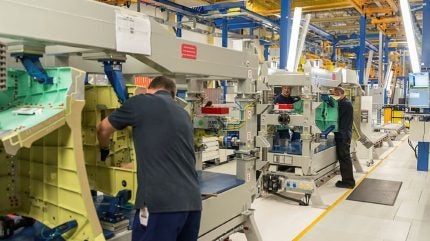
“More must be done to recruit and retain the defence workforce of the future,” urged a recent survey report published by the workforce management solutions company, Guidant Global.
Workers understand that their skills are in high demand, “and many are seeking the best deal possible.” This means that defence organisations must do more to attract the talent they need.
In an exclusive interview, Guidant Global’s client solutions director and British Army veteran, Joel Forrester, revealed that UK defence faces a critical skills deficit. This comes down to a reduced talent pool across various skillsets in science, technology, engineering and mathematics (STEM). Although, it remains a pervasive problem in the UK rather than an industry-specific issue.
Forrester describes the nature of the skills shortage in the UK defence industry, the new eco-system the nation must adapt to now that there is a global resurgence in the industry, and finally how the future workforce will look in the coming years.
John Hill (JH): How must the UK defence industry respond to the skills shortage it is facing right now?
Joel Forrester (JF): I think the issues that the defence sector are finding aren’t just in the defence sector, it’s a STEM skills shortage nationally, across every sector that you can think of from engineering, manufacturing, financial services, things like that.
I think it’s just [about] educating society, on the capabilities of that sector, what it can offer from a career standpoint, but also what it can offer you from a personal standpoint, and growth in business opportunities, skill set experiences.
How well do you really know your competitors?
Access the most comprehensive Company Profiles on the market, powered by GlobalData. Save hours of research. Gain competitive edge.

Thank you!
Your download email will arrive shortly
Not ready to buy yet? Download a free sample
We are confident about the unique quality of our Company Profiles. However, we want you to make the most beneficial decision for your business, so we offer a free sample that you can download by submitting the below form
By GlobalDataSo, I think just [about] educating society and schools and different programmes as early as possible on all the different sector capabilities. Show that it’s not all the negative side of defence; that it is what the word says, ‘defence’. It’s not necessarily going to war and using these tools and technologies and capabilities in a negative way.
I would say we are in an interesting position from a skill standpoint, and that isn’t that the skills aren’t here, it’s about putting them in the right place, and investment to allow companies that need AI [artificial intelligence] talent, for example, to have access to them.

JH: Since the end of the Cold War many countries have fallen behind the curve with shoring up defence. How does the UK now compare to other nations?
JF: I wouldn’t say we’re as advanced as companies who are pumping hundreds of billions of pounds into the defence sector. We are an island, we have to remember that we have a certain size population, a certain budget available for this sector. I think for where we are we’re recognised globally as a strong entity from a defence sector standpoint.
I think there could always be more investment and the sector would always ask for more money as every sector in the in the UK would, however, there are always improvements to be made and other areas to look at.
If you look at our family across the pond in North America, the investment they put into their defence sector is so fascinating. It’s a large volume, they put a lot of [their] budget into their defense sector, so they are able to be really innovative and really invest in new and fantastic capabilities.
It’s just not something that the UK has always done, but it’s definitely moving in the right direction. It’s a new ecosystem. It’s a new world for many countries.

JH: With less people pursuing STEM and many experienced workers retiring, this makes defence companies more reliant on contingent workers. How do contingent workers compare with a permanent workforce? Is this new workforce model sustainable?
JF: [There is] a lot of experience in the contract worker population, they’re obviously vetted to the highest degree, they are qualified. Usually, they will have quite an impressive career mapping.
I would argue that it’s a quicker way to bring highly skilled [people], and skills that are lacking out there from the permanent workforce. It’s a quick way to get it in quickly on immediate urgent projects and programmes while the permanent team can then look to recruit, build and go in it and take that time to identify perhaps a permanent employee for that person. So it’s a way to get the exact talent you need, to get the right outcome you require from your project in a quicker and cost-effective process.
The predictions are that over the next four to five years, 50% of the workforce will be contingent workers.
I would say the defence sector is probably a little bit behind the curve when it comes to the utilisation of contingent workers, same as manufacturing. It’s just a new, quite fresh approach in how to deliver success in business. If we had a conversation in five to ten years’ time asking the same question the stats there will be much higher.
You can’t shy away from the fact that the UK is now an ageing population, people are getting older, people are retiring, and there’s not enough people coming through the bottom of the funnel.







